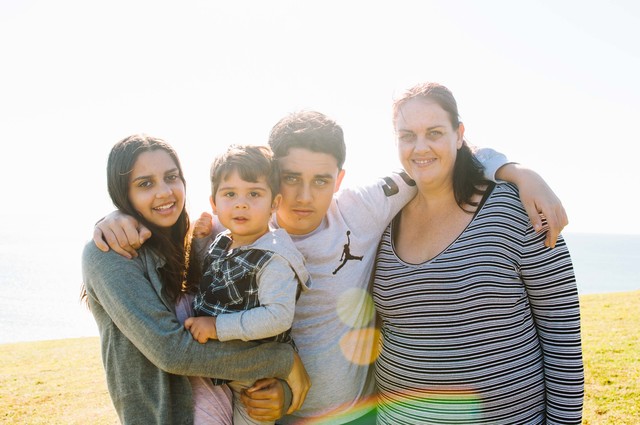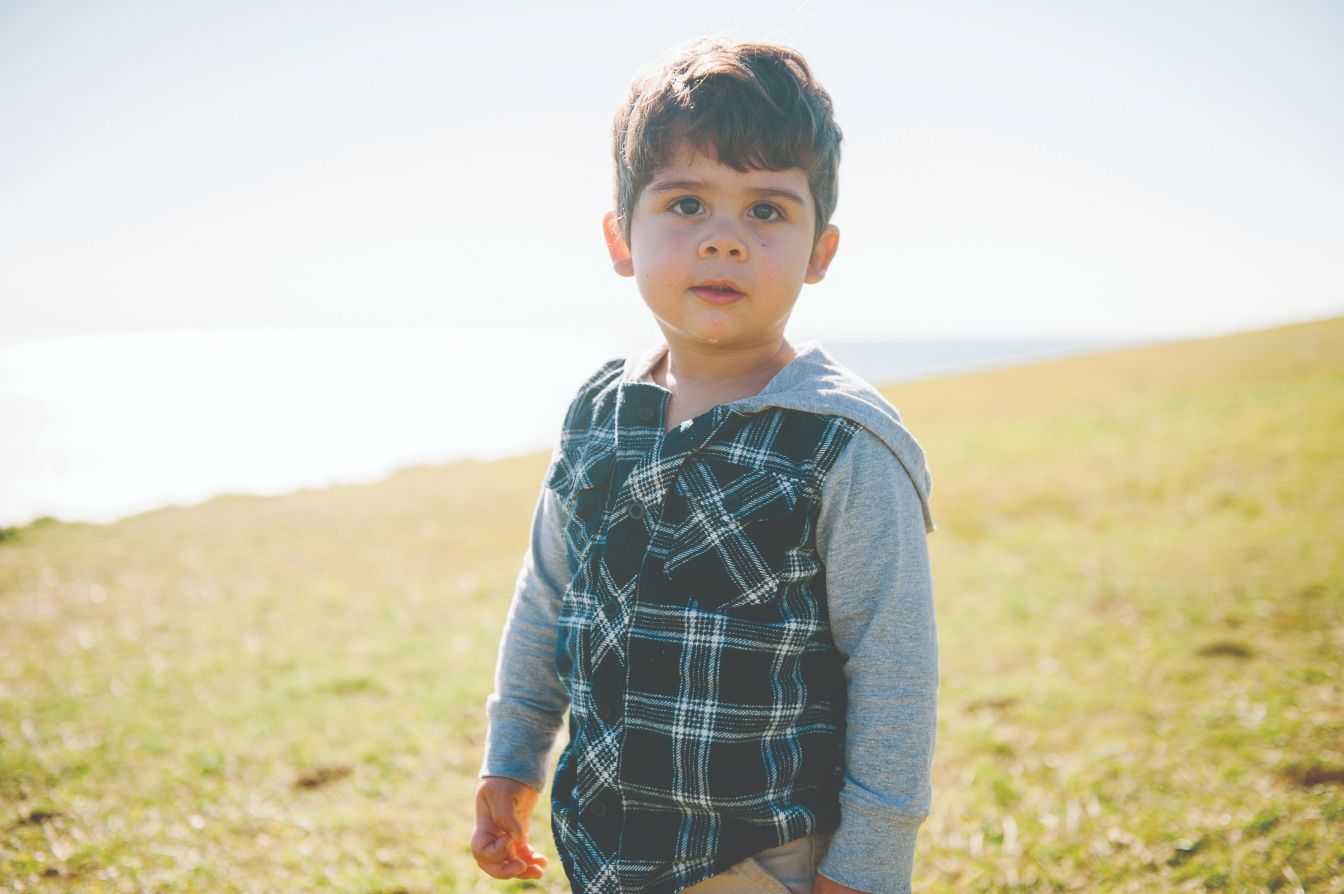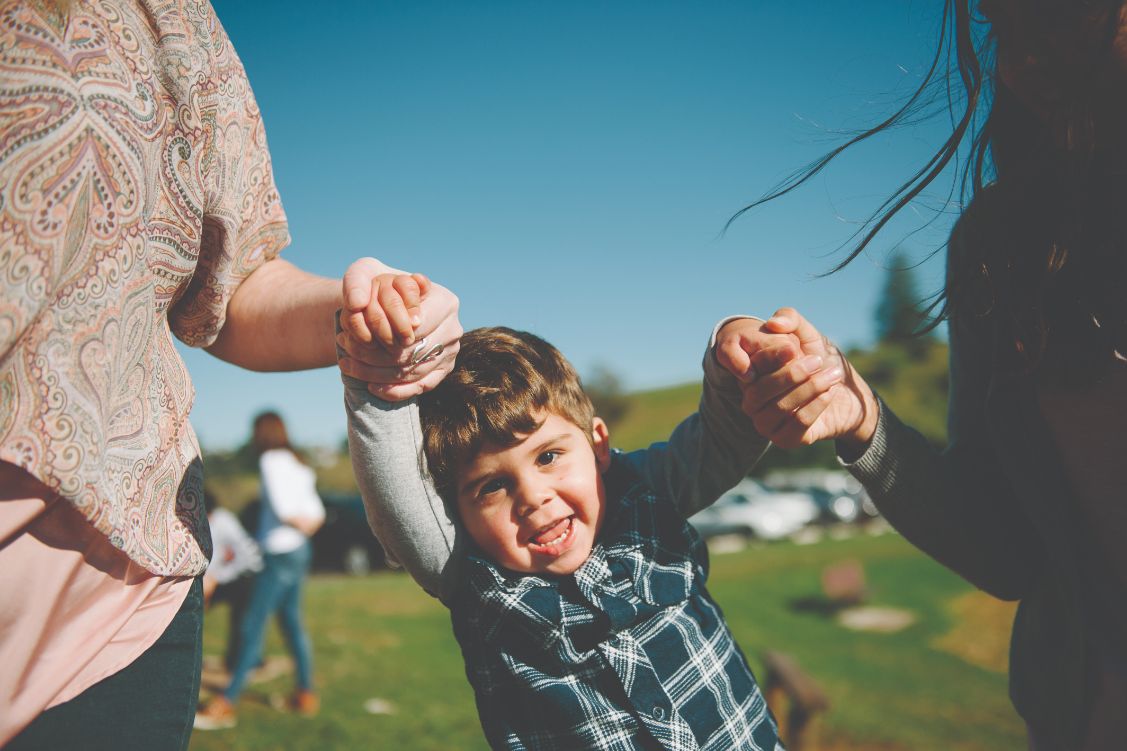Automatic language translation
Our website uses an automatic service to translate our content into different languages. These translations should be used as a guide only. See our Accessibility page for further information.

The first time we met, Marette asked me straight up, ‘Are you here to take my kids?’ I gave it back straight and told her if we had real worries about her children, Kyle (14), Khiana (13) and Mason (one) she would be the first to know. I said my goal was to keep her family together but that could only work if her children were safe. She needed to hear that. It was the best way to start our work together because we had the same goal.
Over the years, Marette and the children had spent time in refuges and supported housing and had just moved into their own place when we met. She told me she had ‘lived out of a bag for so long’ that she didn’t even know how to live in a house. But while Marette and the kids now had a house, they needed it to feel like home, so I made sure the Kyle and Khiana had a new bed each, and Mason a new cot. I wanted them to feel safe and comfortable as they set up their own place.
It wasn’t always easy building a relationship with Marette. She’s someone I call a ‘fierce mamma’, because of how protective she is of her children. I also suspected that she was using ice, which sometimes made her cranky and erratic. She would ring often, yell and tell me she hated me being in her family’s life. It was hard to hear Marette hating what I was doing, but I just had to keep remembering she was afraid. It would have been so easy to step back and say she wasn’t cooperating. The better option was to never forget that she was just frightened of losing her kids. Kyle had already decided to live with his aunty to get away for a while. He said, ‘I know mum loves us, but she’s not a nice person when she’s using ice.’
To help me understand the family, I read files and realised that Marette had lived through some hard times that led to the drugs. I spoke with local services that had been working with the family. They used terms like ‘aggressive’ and ‘not engaging’ to describe Marette. I didn’t see that. I saw that she was worried and got overwhelmed when lots of people were involved in her life. It seemed that other workers had already written their own story about Marette. I wanted to know her story through her eyes. I arranged a consultation with my Aboriginal colleagues and our psychologist, before speaking to my manager and casework specialist about my worries and how I could best support the family.
Next I invited Marette in to have an honest conversation. That meant asking her to take a drug test so that I could get a better picture of her use and what it may mean for her children. I needed to reassure Marette that if her results came back positive, it didn’t mean I was going to swoop in and take her kids. I was clear that we had a team of people to support her and we would make a plan to help.
Marette cried a lot at that meeting. But it was a break through because she admitted to using ice and said she wanted to stop straight away. She didn’t want to go to residential rehabilitation and really wanted to do it on her own, so I consulted with the Clinical Issues Team about how I could help. They told me that lots of parents want to try coming off drugs on their own, as going into rehab can affect their housing, or they worry about being away from home.
Marette had struggled with anxiety for so long, so I understood that the idea of going into rehab with strangers was frightening. The Clinical Issues Team told me that if a parent thinks they can stop using drugs on their own, it can work better than us imposing what we think works best. I gave Marette information about the effects of drugs so she could see the whole picture and knew what to expect and referred her to a number of services. In the end she chose an Aboriginal service she felt safe to work with. I encouraged her to take the lead, as it helped her feel in control of the situation and more likely to stick with it.
We also found a psychologist to help Marette with her anxiety and depression.
Next I looked at how I could support the three kids. They had missed out on so much in recent years. I needed to understand what life was like for them so I spent time with Khiana and Kyle and visited Mason at day care.
Kyle had a longstanding relationship with a local youth worker who continues to support him. I arranged a catch-up with the youth worker, and together we took Kyle out for a milkshake and a chat to help understand where he was at. I love working with teenagers; it’s great how honest they are and call out bullshit when they see it. Kyle was spending a lot of time out of the home, and I didn’t want him to be another kid in care. I visited Kyle at his aunt’s place and made sure it was safe for him. I also got him a mobile phone with credit and put my number in it so he could call at any time. Kyle had been refusing to see his mum for several weeks, but I finally arranged for them to meet. Kyle broke down and hugged his mum and said he loved her and they both cried. It was an important step in getting him home.
Khiana was a beautiful, caring sister who had taken over caring for Mason. She needed help to be a kid again. I took her out for afternoon tea and we talked a lot. Khiana told me she has big plans and wants to be a neonatologist. Straight away I saw how bright she is and I was filled with hope to help her reach her dream.
The next day I organised a meeting with a school that I thought could help Khiana’s dream become real. The school agreed to give Khiana a five-year scholarship! We got her school supplies and a uniform. She was so excited. Marette sent me a photo of Khiana’s first day in her school uniform and I was so proud. The principal said, ‘I know you think we have done you a favour but you have done us one, because this girl is outstanding and will shine.’
Just a short time later, and it’s amazing to see the difference. Khiana is so happy and motivated; she races home and gets straight onto her homework. Marette believes Khiana’s life will be changed forever because of her education.
Everyone working with Marette began to see dramatic changes in her parenting. It was clear she had stopped using drugs and was becoming a better mum for it. I knew there are some circumstances where we don’t need to keep testing parents, like when there are clear signs things are back on track. With this in mind, and the obvious changes I could see in Marette’s parenting, my manager agreed to no more tests – we were going to reward Marette instead. I organised a Christmas hamper filled with lovely things. It was a way to show Marette and her family that we were a team. I wanted to support her to stay clean, and I recognised how hard she had worked to get this far. I also just wanted the kids to have fun at Christmas.
Despite these improvements, Kyle staying away from home was still hard for Marette. I kept telling her, ‘When you’re well and the home is stable, Kyle will come back.’ Sure enough, he did. I helped Kyle set up a sanctuary in his bedroom to make it easier for him to want to stay home, and enrolled him in an outdoor bush program through his school.
Mason is now two and just gorgeous. In the beginning, I could see Marette would get frustrated with him because she was flat and tired. It has been wonderful to see her patience, energy and affection grow. When I visited, I made sure to interact with Mason – I wanted Marette to see that he needed plenty of playtime and conversation. It was a gentle way to model parenting. I also referred him to specialist health services to help with some speech difficulties.
When he started walking, Marette rang me to celebrate. I was so touched. As we came to the end of our work with Marette and the kids, we discussed her plans to stay clean. I encouraged her to let me know if things fell off the rails and if she was tempted to use again. I said, ‘Please just ring me, or reach out to someone you trust.’
I felt Marette wanted to change and just needed someone to walk with her. I have this philosophy about ‘holding the space’. By this I mean, allowing Marette to be who she actually is. This is when the real work begins. And I think that’s what everyone wants … to be accepted for who they are and what they have experienced.

When I was growing up I always wanted to be a youth worker. Then I met the wrong bloke, had kids, and got trapped in a violent relationship which started my depression. I stopped loving myself and eventually I started misusing drugs, and things went downhill fast. Now that I’ve made it through to the other end, I still have the same goal. I want to share my life experiences with others; it won’t just be a job to me.
I started using drugs when my son Mason was small, and I feel like I missed so much. A lot of the time was just a blur. I know I stopped trusting people and pushed them away. I felt judged by everyone and was so lonely. Using drugs became my only comfort.
It all got worse when my eldest son Kyle ran away from home. I wasn’t there for him or my daughter Khiana the way I needed to be. They were teenagers and needed me to be my old self. I went to the police to ask for help to try and get my son home but they told me to see DCJ. I didn’t like DCJ at first, until I met Julisa. I was trying to hide my drug use. I was so scared and anxious the kids would get taken away. Julisa and a casework specialist met with me, asked me about my experiences and said ‘you’ve had it tough’. That made me feel comfortable. When you’re on drugs and in that space, you need help, you don’t need the hate. I kept trying to look after the kids but I couldn’t keep up while I was using. It was a juggling act that deep down I knew I couldn’t balance.
I wasn’t doing the things I should have at first. I would pretend I wasn’t at home when people knocked. A lot of services judged me for this and told Julisa I wasn’t engaging, but it was because I was having a bad time so I shut the world out. It’s just what I do. Only Julisa seemed to understand. Not all ice users are violent junkies. They’re just normal people going through a tough time.
DCJ invited me to a meeting and asked me to do a drug test and I knew they would find out I was using. I cried and cried because I thought I was a step closer to losing the kids. That was my turning point. I told myself I would do everything in my power to stop using and keep my children.
Ice is a horrible drug. DCJ was straight on in and that’s how it should be. It was good that Julisa was persistent; she kept calling and asking me what I needed, no matter how many times I turned her away. I could see she truly cared about the kids. I’m good at sensing things; I know when someone really cares or it’s just a job to them.
It was a breakthrough when Julisa and her manager said they had faith in me and didn’t keep retesting me for drugs. It gave me the strength to stay clean.
I now enjoy the kids and that’s the difference when you’re not using drugs. Khiana changed her Facebook status the other day, counting down the days until she becomes a neonatologist. That’s a paediatrician that takes care of sick or premature babies. I know I only have her till 18 and then she’ll be off to university. I couldn’t be prouder. The scholarship has been so great; she is so smart and loves to learn. She’s also joined the choir and the school band to play clarinet.
Mason goes to day care three days a week and is so happy there. He’s not just my baby but the family baby; we all love him so much. Kyle still has struggles with going to school but at least he’s at home. Julisa and I are working closely with his school to help him get back there full time.
The other day, Julisa drove me to an appointment and took me out for a coffee. I was really upset that day because my dad had just died. I loved that Julisa and I talked like two adults instead of me being the ‘drug user’ and her being the ‘FACS caseworker’. There were no ‘roles’ that day. It felt like two human beings connecting because of trust and acceptance. It was so comforting. Julisa opened up a bit and told me she started her career with a Certificate IV in Community Services from TAFE and I had an epiphany: ‘Hey, that could be me. I could help women who are struggling like I was.’ Sharing my story is another step in my recovery.

Director Community Services, Illawarra Shoalhaven NSW Department of Family and Community Services
As I started to read about Marette, Kyle, Khiana and Mason many families came into my mind. This is not an unfamiliar story I thought; I was already formulating the various pathways for how Julisa’s intervention with this family might unfold. Julisa’s first interaction with Marette was open, honest and respectful; it created the space for the beginning of a relationship that was built on trust and acceptance. Together they worked out very quickly they shared the same goal; to keep the family together so long as the children remained safe.
Like with so many of the families we work with the journey is often a bumpy one where the best laid plans don’t always work out the way we intended. Behaviour change takes time, hard work, courage, hope and patience. What stood out for me was that Julisa saw Marette through a lens of empathy, she took the time to read the family’s history, she was curious about Marette and the children’s experience of life and previous interventions, she listened to Marette and included her in the decision-making, she did not get stuck with other people’s views, and she challenged language like ‘aggressive’ and ‘not engaging’, which is sadly what we see recorded in the stories of many families. This reminded me of the power of language and how quickly just one word can change our frame of reference, intentions and the subsequent relationships with parents, children and young people.
What keeps caseworkers engaged in this work with families? Getting to the end of a journey like the one in Marette’s story, I could feel the sense of achievement and pride coming through in the words she spoke about her children, of what she has achieved, the courage it has taken, the belief she now has in herself and the change she has made for her children.
16 May 2023